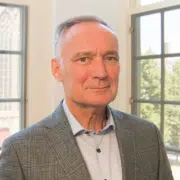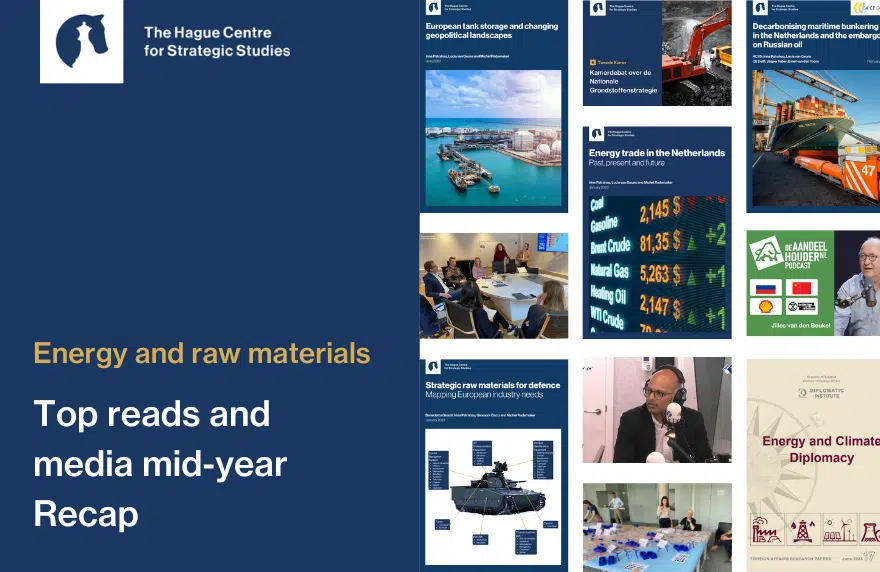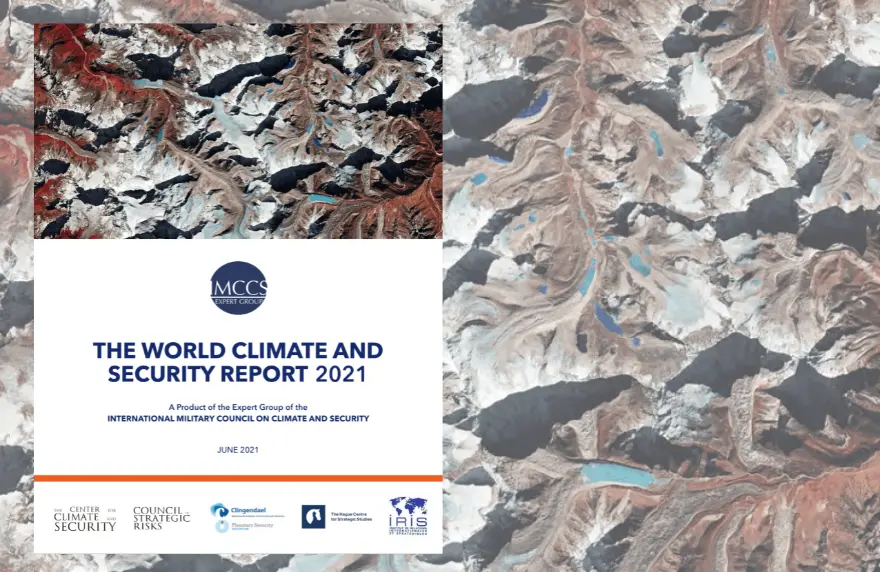As we are now in the Summer of 2023 it’s time to look back on the first half year! In case you want to catch up on all you might have missed, this recap highlights all of our top publications, events, podcasts and videos on Climate Security. Curious about older publications on the security implications of climate change and global warming? The HCSS annual report 2022 highlights all of our content from last year.
Publications

Resilient and Robust: Climate-Proofing the Military for Increased Military Effectiveness
The war in Ukraine in 2022 brought significant increases in NATO and European defence budgets and has taught us the importance of securing global supply lines. Until now, climate-related discussions rarely affected military force requirements. Today, there is a growing recognition of the importance of climate proofing the armed forces as a precondition for operational effectiveness, rather than as a positive side effect. This report finds that There is a rapidly developing range of green innovations that can boost military self-sufficiency and provide incentives to regard ‘greening the force’ as an opportunity.
Understanding the Pathway from Water Insecurity to Urban Migration in Southern Iraq
In southern Iraq, decades of water insecurity have influenced migration patterns by endangering agricultural output and the livelihoods of farmers. Although global migration is – contrary to popular discourse – remarkably stable, representing on average 3% of the global population in the last 50 years, the majority of people tend to migrate within rather than across borders. In Iraq, employment in the agricultural sector has declined over time but remains at 18% of the workforce. This paper addresses how water insecurity may indirectly increase migration patterns by impacting individuals’ livelihoods, health, energy and food security.


Blog: Laura Birkman and Irina Patrahau | Looking back at the UN 2023 Water Conference
In southern Iraq, decades of water insecurity have influenced migration patterns by endangering agricultural output and the livelihoods of farmers. Although global migration is – contrary to popular discourse – remarkably stable, representing on average 3% of the global population in the last 50 years, the majority of people tend to migrate within rather than across borders. In Iraq, employment in the agricultural sector has declined over time but remains at 18% of the workforce. This paper addresses how water insecurity may indirectly increase migration patterns by impacting individuals’ livelihoods, health, energy and food security.
Events
His Excellency Dr Zambry Abd Kadir, the Minister of Foreign Affairs of Malaysia, visits HCSS
20/6/2023 | HCSS was honoured to welcome His Excellency Dr Zambry Abd Kadir, the Minister of Foreign Affairs of Malaysia, for a working visit this week, together with a delegation including H.E. Nadzirah Osman, the Ambassador of Malaysia to the Netherlands and Permanent Representative of Malaysia to the OPCW. The visit was part of efforts to enhance the bilateral relations between Malaysia and the Netherlands. The delegation was then given a briefing by Senior Strategic Analyst Laura Birkman, Head of the HCSS Climate and Security Programme, on a range of research and activities, including ongoing work for the Water, Peace and Security partnership.


Climate security in the Indo-Pacific: How can Europe contribute? Dutch-French Dialogues on the Indo-Pacific.
The Indo-Pacific is a region with high vulnerability to climate-related hazards such as coastal, riverine flooding, heatwaves, and tropical storms. At the same time, the Indo-Pacific is a region that is experiencing rapid economic growth while coming to terms with the long-term threats of global warming and climate change.On May 11th, Dutch and French experts came together for this event organised by HCSS in cooperation with the Embassy of France in the Netherlands and the Institut Français des Pays Bas to discuss climate security in the Indo-Pacific, as well as the role that European states could play in mitigating climate-related hazards in the region.
Irina Patrahau to speak at Utrecht University Conference on the Weaponization of the Environment
On May 26th 2023, Utrecht University MA Conflict Studies & Human rights programme will be hosting a Green Conflict Studies Conference on the Weaponization of the Environment. HCSS Strategic Analyst Climate and Energy, Irina Patrahau spoke at the event.


UN 2023 Water Conference | “Water, War, and Peace” panel
On Friday, March 24th, HCSS strategic analyst Irina Patrahau participated in a panel on “Water, War, and Peace”. The official side event brought together experts from the frontlines of global water security to explore deep and growing links between water and conflict, and the essential strategies to reduce the risk of water-related violence and find paths to peace.Water and energy systems are regularly targeted in the Russia-Ukraine war, Iraq, Africa, and elsewhere. Access to water has often been a catalyst for tensions and violence, and water itself has long been a target and tool of war. As Irina Patrahau stated: “Water security is not just about water – it’s about food, energy, health and human security.
UN 2023 Water Conference | “Nature-based Solutions for Water and Peace” panel
From March 22-24, the UN 2023 Water Conference took place in New York, co-hosted by Tajikistan and the Netherlands. On Friday, March 24th, senior strategic analyst and climate security expert Laura Birkman presented the HCSS security assessment framework at a panel discussion organised by The Weather Makers, in collaboration with partners HCSS, Anthesis and Tamatta, at the UN Headquarters.This panel on ‘Nature-based Solutions for Water and Peace’ used a practical and well-researched case-study for the Sinai Peninsula to demonstrate how we can turn the tide of soil degradation and water scarcity in a conflict affected area while taking into account the social, economic, political and security dynamics of a region.


All the HCSS events for UN Water Week 2023
The UN 2023 Water Conference took place at UN Headquarters in New York, 22-24 March 2023, co-hosted by Tajikistan and the Netherlands. HCSS was proud to announce it hosted and co-hosted a number of side events, together with our partners. Discover all the events here.
Video Content
Rewatch | Webinar: Crowds & Machines, The Next Phase
How can advanced data technologies like satellite imagery and machine learning support the development of climate change policies? On Wednesday, March 15th, Hans van ‘t Woud (BlackShore), Koen Verberne (52impact) and Laura Birkman (HCSS) took a deep dive into the unique approach developed by the Crowds & Machines consortium that combines game-driven crowd source analytics, machine learning, and strategic analysis. Missed the online seminar? Rewatch it here


Resilient and Robust: Climate-Proofing the Military for Increased Military Effectiveness
Since the Ukraine war, there has been a growing recognition of the importance of climate proofing the armed forces as a precondition for operational effectiveness, rather than as a positive side effect. Energy security is now a priority of NATO and the EU. A new HCSS report shows how new technologies can help armed forces reduce their carbon and logistical footprint, while maintaining – or even strengthening – their operational effectiveness. This video highlights the key features of that report. Better incentives for green innovation can help to reduce costs and improve operational capability at the same time. You can watch the video here.
Water, War, & Peace Webinar
Water and energy systems are regularly targeted in the Russia-Ukraine war, Iraq, Africa, and elsewhere. Access to water has often been a catalyst for tensions and violence, and water itself has long been a target and tool of war. How are the links between water and security changing? In an increasingly water-stressed world, what essential strategies can reduce the risk of water-related violence and what are the paths to peace? Watch the video here.


Nature Based Solutions for Water and Peace – recording at UN 2023 Water Conference
Recording of the Side Event ‘Nature Based Solutions for Water and Peace’ at UN Water Conference March 22-24, 2023, UN Headquarters New York. The Weather Makers hosted the event together with HCSS – The Hague Centre for Strategic Studies, Anthesis Group and Tamatta.You can watch it on YouTube here.
Major news items
Richard Nugee joins HCSS as Special Strategic Advisor on Climate Security
HCSS was pleased to announce that Lieutenant General (Retd) Richard Nugee will be joining us as non-resident Special Strategic Advisor on Climate Security. Richard Nugee CB CVO CBE has earned international recognition for bringing the implications of Climate Change and Sustainability to the Defence and National Security sectors. After a full career in the British Army, as his final role he wrote a Review of Defence’s approach to Climate Change and Sustainability. He is now the Non Executive Director for Climate Change and Net Zero for the Ministry of Defence. Read Richard’s biography here.


Laura Birkman | ISPI – Le risorse e la loro “Weaponization”
The invasion of Ukraine brought war to Europe, exactly one year ago. But it’s a different war from the one we imagined, and has become a dramatic case study for many analysts, forcing us to reflect on what will be the future of war and the war of the future. Together with missiles, drones, satillites and AI now also entered the battlefield – as did the use of resources. For the new ISPI longread, “The Future of War”, Giampaolo Musumeci spoke to HCSS senior strategic analyst Laura Birkman about climate change and its effect on the “weaponization” of resources.











